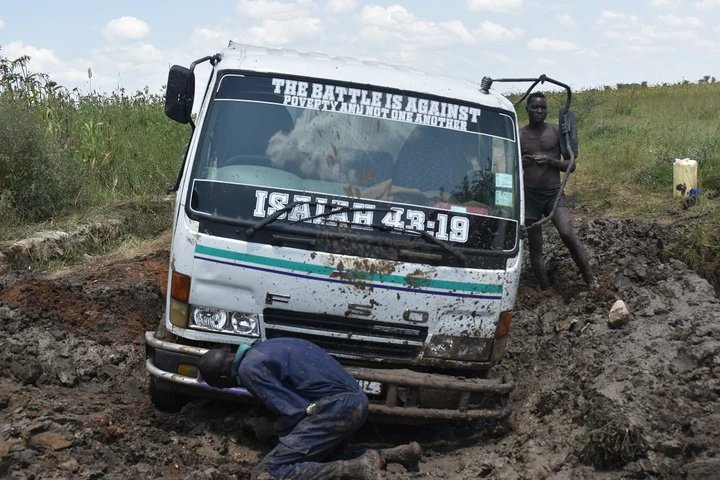Museveni’s “Do You Sleep on the Road?” comment sparks fury over Kotido’s impassable roads

Residents push a truck stuck in the mud along the Soroti–Abim–Kotido road. Local leaders have urged the government to prioritize tarmacking Karamoja’s key transport corridors to save lives and boost trade.
Kotido, Uganda: President Museveni’s offhand remark during a campaign rally in Kotido District has sparked public outcry and reignited debate over the deplorable state of roads across Karamoja, a region that remains among Uganda’s most neglected in infrastructure development.
Speaking at a rally in Kotido over the weekend, Museveni attempted to draw a contrast between Karamoja and other regions by asking residents, “Do you sleep on the Soroti–Moroto tarmac road? That road is very good. So do you sleep there?”
While the statement drew laughter from some sections of the audience during the rally, it struck a nerve for many Kotido residents who live the daily hardship of impassable, mud-filled roads that make transport nearly impossible, especially during the rainy season.
“During the rains, we cannot move,” said Loy Patrick, a trader in Kotido Town. “Even ambulances get stuck. People die while waiting for help.”
Residents say the collapse of Alito Bridge in September severed key connections along the Kapelbyong–Kotido route, isolating communities and contributing to fatalities. On the Soroti–Abim–Kotido–Kaabong corridor and Kotido–Moroto road, vehicles frequently get trapped in deep mud, stalling access to markets, schools, and hospitals.
Local leaders have repeatedly sounded the alarm. RDC Charles Ichogor acknowledged that Museveni’s remark may reflect progress elsewhere, but not in Karamoja.
“The President’s comment is accurate for Teso and other regions, but here in Karamoja, these roads are nearly impassable half the year. We have repeatedly requested prioritization for tarmacking key routes,” Ichogor said.
Kotido LCV Chairperson Lotee Paul Komol added that the road crisis continues to cripple economic growth: “Farmers cannot get produce to markets, students miss school, and health services are inaccessible. Development cannot happen on broken roads.”
A Region Left Behind
For many residents, Museveni’s comparison to the Soroti–Moroto tarmac felt dismissive of decades of neglect. “We appreciate national development, but our region remains behind,” said Lobur Elijah, LCIII Chairperson of Rengen Sub-county. “Comparing our roads to Teso’s is insensitive to our struggles.”
Transporters and traders echoed similar frustrations. Adolfo Ochieng, a local businessman, said every rainy season means financial loss. “A journey that should take three hours can take a whole day. Goods spoil before reaching markets, and transport fares double.”
The consequences are severe; farmers lose perishable produce, patients miss treatment, and students miss classes for weeks.
Nanger Joseph Tuko, a boda boda chairperson, recounted a chilling incident where an expectant mother nearly lost her life when her vehicle got stuck en route to the hospital. “These are not isolated incidents. They happen every rainy season,” he said.
And that’s not all, the poor infrastructure has paralyzed essential services. School attendance plummets during the rainy season as pupils and teachers struggle through waterlogged paths. Health centres like Kotido Health Centre IV often face drug shortages and delayed referrals due to impassable roads.
As one teacher lamented, “When roads fail, everything else fails; health, education, trade, and even security.”
Local Calls for Urgent Action
Nuria Teko Hasfa, Kotido Woman MP aspirant and LCV Vice Chairperson, has urged the Ministry of Works and Transport to expedite long-delayed road contracts. “We need urgent upgrades along the Kotido–Moroto, Soroti–Abim–Kotido, and Kotido–Kaabong corridors. These roads are our lifelines,” she said.
Despite years of promises, progress has been slow. While parts of Moroto and Nakapiripirit boast newly tarmacked roads, most of Kotido remains cut off, with locals resorting to motorcycles and improvised bridges to survive the rainy season.
Political analysts say Museveni’s remark, though possibly meant in jest, exposed the deep inequalities in national infrastructure development. “It may have been intended humorously, but it hurts,” said Elder Apaloboke of Nakapelimoru. “Our people endure daily hardship. We need solutions, not comparisons.”
Economists warn that the infrastructure gap continues to cost Karamoja billions in lost productivity and investment opportunities. Transport delays, high fuel costs, and damaged goods have made business expansion nearly impossible.
“Roads are the arteries of development,” a local journalist and civic advocate observed. “Without tarmac, all government programs; from wealth creation to education, remain crippled.”
Resilience Amid Neglect
In the face of adversity, Karamoja’s communities remain resourceful. Locals have formed informal teams to guide stranded vehicles through mud, build makeshift causeways, and manually repair roads after heavy rains.
Yet, residents insist these stopgap efforts are unsustainable. “We adapt, but it’s not sustainable,” said Loy Patrick. “We deserve better roads to live and work in dignity,” adding, “We don’t need jokes, we need roads.”



0 Comments